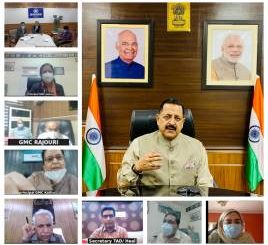
National Skill Development Corporation (NSDC) and National Council for Vocational Education and Training (NCVET), under the aegis of Ministry of Skill Development and Entrepreneurship (MSDE) through Sector Skill Councils (SCCs) demonstrated its unwavering commitment to make vocational education and skill training aspirational for Indian youth through strengthening the public-private partnership. MSDE conducted a workshop to discuss the critical role of SSCs in making the skill ecosystem more agile and response to industry needs by reimagining and redesigning their roles making them more effective and impactful. The workshop saw discussions on the need for industry driven skill training programs for various job roles in different sectors to cater to the industry needs.
The workshop was held in the presence of Shri Atul Kumar Tiwari, Secretary, MSDE, Dr. N S Kalsi, Chairman, NCVET; Dr. K K Dwivedi, Additional Secretary, MSDE; Ms. Trishaljit Sethi, DG, DGT; Ms. Sonal Mishra, Joint Secretary, MSDE; Dr. Neena Pahuja, Executive Member, NCVET; Shri Nilambuj Sharan, Sr. Economic Advisor, MSDE; and Shri Ved Mani Tiwari, officiating CEO, NSDC and MD, NSDC International.

The event brought together all 36 SSCs along with their CEOs/representatives along with the Chairpersons of some of the SSCs. It focuses on mapping skills and qualifications aligning with international standards to equip youth with a competitive edge and agility for international markets. It also envisions to prioritize awareness and counselling sessions on designing long-term training programs to meet the demand of high-skilled personnel in overseas markets.
The establishment of industry partnered state-of-the-art infrastructure in new-age courses and skilling programs in various fields ranging from AI, machine learning, blockchain and others, will facilitate on-the-job training, integrating real-world work scenarios and guidance from industry expert that aid in boosting overseas mobility and improved placements.
Speaking at the event, Shri Atul Kumar Tiwari, emphasized the importance of public-private sector collaboration in realizing Prime Minister Narendra Modi’s vision of making India a technological powerhouse. He highlighted the need for a centralized and outcome-oriented approach that integrates curriculum development and experiential learning courses, with Sector Skill Councils (SSCs) playing a pivotal role.

Shri Tiwari emphasized the significance of the Recruit, Train, and Deploy (RTD) model, which offers emerging talent opportunities to upgrade their skill sets, gain accredited training, and enhance their employability. He also highlighted the demand for trainers and assessors in the capital goods and iron and steel industry, presenting a lucrative opportunity to develop customized training programs that align with industry needs and enhance the job readiness
of the youth. He expressed his belief that such collaborations would establish credible pathways, enabling skilling programs to receive the recognition they deserve for hands-on learning and for improving the employability of the nation’s youth.
Furthermore, the Ministry and SSCs discussed the skill gap study to devise appropriate skilling interventions to bridge the gap. The study has been performed across trainers and assessors, job roles, centre of excellence and fee-based curriculum to comprehend the magnitude and nature of the skill gap. The study reveals that the top five trainers and assessors in terms of PMKVY job roles are Iron and steel, capital goods, apparel, power and IT/ITes. On the other hand, the most in demand job roles for PMKVY are textile, electronics and rubber chemical and petrochemical, which presents a promising opportunity to upskill the youth in relevant sectors and boost employability.
The meeting saw concrete discussions around the idea of creating skill gap studies at the state/regional/cluster level to address migration and other externalities. This could be a game-changer in understanding workforce dynamics and bridging gaps focusing on localized solutions for a stronger and more sustainable economy. SSCs also discussed embracing micro-credentialing of job roles to boost employability in various sectors. By recognizing skills, individuals can stay relevant in today’s fast-paced job market.
The meeting also emphasized on the need of promoting the benefits of apprenticeship for vocational education and training qualifications to cater to the needs of higher education and school students. These courses will be designed on industry validated occupational standards and current market requirements to run at ITI, polytechnics, and other technical institutions.
Reaffirming its commitment to build a scalable, transparent and sustainable mechanism for skill development efforts, the SSCs focuses on strengthening the industry connect to comprehend the evolving skill requirements, emerging trends and job roles in line with equipping the youth with new age skills. It develops content and curriculum for various Qualification packs (QPs) in regional languages to address language barriers and improve the learning outcomes. Localization of training delivery, continuous feedback and assessments are some other measures that shall be incorporated to amplify the impact of skill development initiatives.







Leave a Reply
You must be logged in to post a comment.